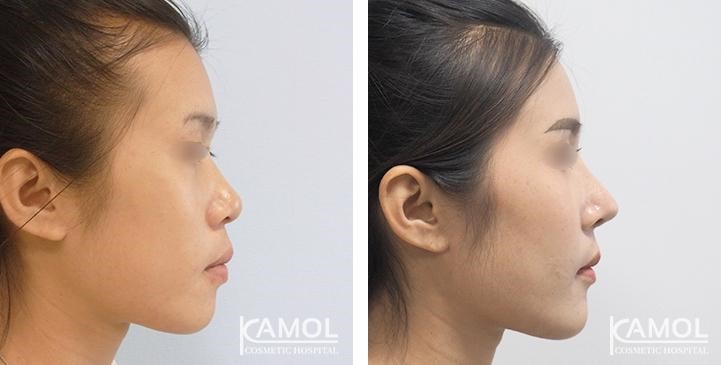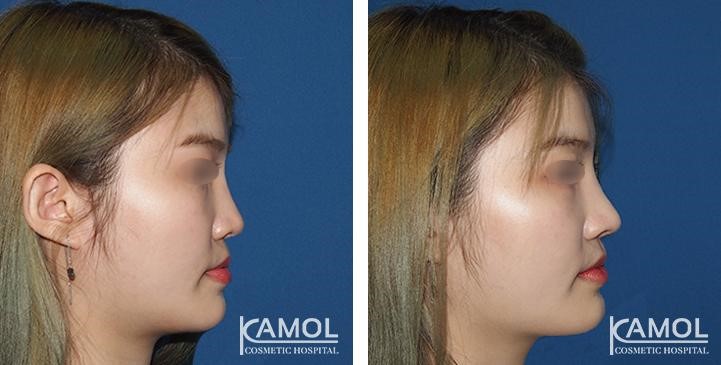A natural-looking rhinoplasty using e-PTFE Gore-Tex material.
e-PTFE, also known as Gore-Tex®, is a medical material that has been used for over 30 years. It is made of expanded polytetrafluoroethylene, and is known for its porous texture which allows for natural tissue growth and integration. This material is used in various medical procedures such as the fabrication of synthetic blood vessels, wound closure in hernia treatment, and in plastic surgery, such as rhinoplasty and forehead augmentation, as it produces natural-looking results.
Advantages of e-PTFE Augmentation:
The use of e-PTFE, or Expanded Polytetrafluoroethylene (commercially known as Gore-Tex®), in medical procedures such as rhinoplasty has several advantages over other materials, particularly silicone. One of the main benefits of e-PTFE are:
- Its ability to provide a more natural look than silicone. This is because e-PTFE has a porous texture that allows the body's tissue to grow and penetrate, resulting in the synthetic material and natural tissue safely merging. This means that a rhinoplasty using e-PTFE can result in a raised nose bridge that looks natural without the presence of side grooves or tissue contraction around the implant.
- Its biocompatibility. It is well-tolerated by the body and has minimal risk of infection or rejection, which can occur with other materials. Additionally, e-PTFE is a durable and long-lasting material, and it does not degrade over time which means that the results of a rhinoplasty using e-PTFE can be expected to be long-lasting.
- It has been used for more than 30 years and has a proven track record in various medical procedures, including the fabrication of synthetic blood vessels, wound closure in hernia treatment, and in plastic surgery such as rhinoplasty and forehead augmentation. This makes it a well-established and reliable material for use in medical procedures.
Overall, e-PTFE is a versatile, safe and effective material that can provide natural-looking results when used in rhinoplasty and other plastic surgeries.
Disadvantages of e-PTFE Augmentation:
While e-PTFE has many advantages as a material for augmentation procedures, it also has some disadvantages that should be considered:
- The procedure is more complex compared to other augmentation materials. This is because e-PTFE implant requires a special contouring technique, and it needs to be soaked in a disinfectant solution for 10-15 minutes before implantation to prevent bacterial infection of the tissue. This additional step increases the length of the procedure and requires specialized techniques and equipment which can add to the cost of the surgery.
- More costly compared to other augmentation materials. This is because the manufacturing process for e-PTFE is more complex and specialized, and the materials and equipment required for the procedure are more expensive. Additionally, the implantation technique for e-PTFE is more demanding than other materials, which can also add to the overall cost of the procedure.
It is important to note that the use of e-PTFE as an augmentation material is not suitable for everyone and that every patient should have a detailed consultation with the surgeon to evaluate the suitability of e-PTFE before deciding on the procedure.
Frequently asked questions about e-PTFE (Gore-Tex®) rhinoplasty:
Q: Is e-PTFE (Gore-Tex®) harder to fix than silicone?
A: Not necessarily. The reconstruction results depend on the surgeon's skills and experiences. In fact, e-PTFE can be reshaped and remodeled like any other materials.
Q: Why does e-PTFE rhinoplasty cost more?
A: e-PTFE itself is a material that costs more. Also, the procedure of e-PTFE rhinoplasty is more complicated. The e-PTFE implant has to be handled with precision, meticulousness and thorough care when it comes to shaping. It has to be soaked in disinfectant solution for at least 10-15 minutes before the implantation to prevent bacterial infection.
Q: Is e-PTFE (Gore-Tex®) rhinoplasty safe?
A: e-PTFE is a well-established and biocompatible material that has been used in medical procedures for over 30 years. However, as with any surgical procedure, there are risks and potential complications that should be discussed with a surgeon before deciding on the procedure.
Q: How long do the results of e-PTFE rhinoplasty last?
A: e-PTFE is a durable and long-lasting material that does not degrade over time. The results of e-PTFE rhinoplasty can be expected to be long-lasting.
Q: Is e-PTFE (Gore-Tex®) rhinoplasty suitable for everyone?
A: Not all patients are suitable for e-PTFE rhinoplasty, and every patient should have a detailed consultation with the surgeon to evaluate the suitability of e-PTFE before deciding on the procedure.
Q: Will e-PTFE rhinoplasty leave any visible scarring?
A: As with any surgical procedure, there is a chance of scarring, but the incision made in a rhinoplasty is usually made inside the nose, making it less visible.

Before and After pictures of patients having e-PTFE Gore-Tex® rhinoplasty.
Rhinoplasty with e-PTFE
Before augmentation: patient had short flat nose, broken bridge, upturned tip.
Wanted: high nose, pointed tip, not thin, by freeing the nose with ePTFE, Gore-tex
Results: A prominent nose, a protruding tip, and a beautiful curve.

Before and After pictures of patients having e-PTFE Gore-Tex® rhinoplasty.
Rhinoplasty with e-PTFE
Before augmentation: short flat nose, broken bridge, upturned tip.
Wanted: high nose, pointed tip, not thin, by freeing the nose with ePTFE, Gortex
Results: A prominent nose, a protruding tip, and a beautiful curve.

Before and After pictures of patients having e-PTFE Gore-Tex® rhinoplasty.
e-PTFE rhinoplasty + ear bone
Before augmentation: there was a problem with a short flat nose, a broken bridge, and an outstretched tip.
Wanted: high nose, pointed tip, not thin, by freeing the nose with ePTFE, Gortex
Results: A prominent nose, a protruding tip, and a beautiful curve.

